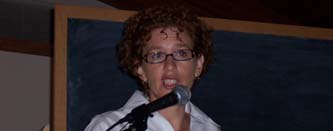War, poverty and AIDS are all plaguing Africa but the solutions to those problems don’t lie in the United States or other countries, says Colleen Milstein. The crucial work of solving those problems will have to be done by Africans.

Milstein, who is from South Africa, spoke in Madison on "A Christian Response to HIV/AIDS" on Thursday evening, May 25th, at the Youth With A Mission building at 4802 Dakota Drive. Milstein is currently a director of Youth With a Mission in Burtigny, Switzerland.
During a recent 6-week tour of east African countries, by public transportation, Milstein traveled through three wars. She said there wasn’t a day that she didn’t meet someone with AIDS or who had just lost a family member to AIDS. "AIDS is a disease that is wiping out communities," she said. "The breakdown of the family is the most destructive thing." Many African families today consist of grandparents raising their grandchildren. "Those who would be raising the next generation are gone." The number of AIDS orphans in Africa now totals 12 million.
"It’s going to be slow to turn around a continent," she said. "It won’t be done from the outside. Throwing more money at it won’t resolve the issue." Her skepticism comes from observing aid groups up close. "I have serious questions about whether [outside aid] is bulding nations or impoverishing nations."
Not that money isn’t part of the solution, or that we in the United States shouldn’t get involved. But Milstein said that it’s going to take investments of time and relationships along with financial resources.
It’s going to take more people like James, who manages a small organization addressing AIDS in Uganda, deeply committed to making a difference in people’s lives. "He has a big dream. He wants to influence his nation and he’s going to," she said.
And more people like Chris, a young Brit just out of school, recently arrived in Rwanda. He started a small manufacturing company that only employs orphans who are the heads of their families. "He’s one person, with one specific project. That’s how we change a nation," she said. Some of his 25 employees are now making enough income to put siblings into school.
Milstein says 1,000 people, each committed to living and working in an African village for 3-5 years, can bring about major changes. "Do one thing well and change one community," she said. She suggested a small business could not only create needed jobs but also create scholarships that would help keep children in school.
Her own country, South Africa, has experienced a modern day miracle with the abolition of apartheid and the reconciliation that followed. "I was there the day Mandela came out of prison," she said. "I saw him." But rebuilding a nation after that experience doesn’t happen overnight. "Now we’ve just begun."
Riding through the countries of east Africa in taxis and buses, Milstein’s love for Africa was deepened. It was scary at times, yet encouraging as well. "I saw a continent with incredible people who want a change in their lives," she said.
"My life was never threatened," she observed. "But my books were often taken." Sitting in a bus, waiting for it to fill so it could depart, a fellow passenger would often ask what she was reading. Someone else would join the conversation, the book would be passed around and one person or the other would just start reading it for themselves.
Books are not readily available in many parts of Africa because of poverty. Clean water and health care are also lacking. But there is no lack of opportunities for ministry. "I think God’s heart breaks over these situations," she said.
A podcast of Colleen Milstein’s talk will be online soon at http://www.ywammadison.org.
Madison’s Christ Presbyterian Church is involved in one village in Africa, Nyamagabe, Rwanda. For more information, click here.

